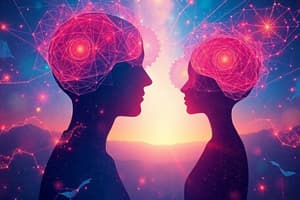Podcast
Questions and Answers
الدوافع الذاتية تسمح للأفراد بالتعرّف بشكل كامل على أهدافهم وأفعالهم.
الدوافع الذاتية تسمح للأفراد بالتعرّف بشكل كامل على أهدافهم وأفعالهم.
False (B)
الأمور الثقافية يمكن أن تؤثر في رفع مستوى الدافعية.
الأمور الثقافية يمكن أن تؤثر في رفع مستوى الدافعية.
False (B)
النظريات التقليدية للدوافع تواجه انتقادات بسبب نطاقها الواسع وكفاءتها في التقاط جميع العمليات الدافعية.
النظريات التقليدية للدوافع تواجه انتقادات بسبب نطاقها الواسع وكفاءتها في التقاط جميع العمليات الدافعية.
False (B)
نموذج العمليات الدافعية العصبية يقترح ثلاثة عمليات فرعية للدافع: التوجُّه نحو المكافأة، اتخاذ القرارات المستندة إلى القيم، والتحكُم الهادف للأهداف.
نموذج العمليات الدافعية العصبية يقترح ثلاثة عمليات فرعية للدافع: التوجُّه نحو المكافأة، اتخاذ القرارات المستندة إلى القيم، والتحكُم الهادف للأهداف.
النية هي عملية إدراكية تُمثِّل تسلسلًا مُخطَّطًا للإجراءات تهدف إلى تحقيق هدف مُحدد.
النية هي عملية إدراكية تُمثِّل تسلسلًا مُخطَّطًا للإجراءات تهدف إلى تحقيق هدف مُحدد.
النيات يمكن أن تُشكَّل من خلال نظرية السلوك المُخطط له (TPB) التي تُفترض أن النيات يُحَدَّدُها ثلاثة عوامِل رئيسية: الاتِّجاه نحو السلوك، الأنْظُمة الذاتِيَّة، والتَّحكُّم في السلوك المُشْتَهى.
النيات يمكن أن تُشكَّل من خلال نظرية السلوك المُخطط له (TPB) التي تُفترض أن النيات يُحَدَّدُها ثلاثة عوامِل رئيسية: الاتِّجاه نحو السلوك، الأنْظُمة الذاتِيَّة، والتَّحكُّم في السلوك المُشْتَهى.
الدافع هو العامل الخارجي الذي يبدأ الفعل.
الدافع هو العامل الخارجي الذي يبدأ الفعل.
الدافع والنية عاملان متصلان وضروريان لفهم سلوك الإنسان.
الدافع والنية عاملان متصلان وضروريان لفهم سلوك الإنسان.
الدافع يلعب دورًا حرجًا في تحديد اتجاه وقوة سلوك الفرد.
الدافع يلعب دورًا حرجًا في تحديد اتجاه وقوة سلوك الفرد.
هناك أنواع مختلفة من الدوافع، بما في ذلك الدافع الخارجي والدافع الذاتي.
هناك أنواع مختلفة من الدوافع، بما في ذلك الدافع الخارجي والدافع الذاتي.
الدافع الشخصي ينشأ من عوامل خارجية مثل المكافآت والعقوبات.
الدافع الشخصي ينشأ من عوامل خارجية مثل المكافآت والعقوبات.
النية هي العملية التي تتنبأ بسلوك ما في المستقبل.
النية هي العملية التي تتنبأ بسلوك ما في المستقبل.
Flashcards are hidden until you start studying
Study Notes
Motivation and Intention in Human Behavior
Understanding human behavior requires an exploration of the underlying factors that guide our thoughts, decisions, and actions. Motivation and intention are two key components that shape our behavior. Motivation is the internal factor that initiates action, while intention is the cognitive process that predicts future behavior. Both motivation and intention are interconnected and essential for understanding human behavior.
Definition and Importance of Motivation
Motivation is defined as "the psychological feature that arouses an organism to act towards a desired goal". It is a complex process driven by various factors such as needs, drives, values, beliefs, and expectations. Motivation plays a critical role in determining the direction, strength, and persistence of an individual's behavior. It influences how much effort an individual puts into achieving a goal and whether the behavior is repeated in the future.
Types of Motivation
There are different types of motivations, including intrinsic motivation, extrinsic motivation, and self-determined motivation. Intrinsic motivation arises from within the individual and is driven by internal rewards such as pleasure, enjoyment, and personal growth. On the other hand, extrinsic motivation comes from external factors such as rewards, punishments, and social pressure. Self-determined motivation combines elements of both intrinsic and extrinsic motivation and allows individuals to fully identify with their goals and actions.
Factors Affecting Motivation
A variety of factors can impact motivation, including personality traits, social context, cultural background, and life experiences. Motivation can be enhanced by creating challenging tasks, providing opportunities for personal growth, and fostering a supportive and inclusive social environment.
Limitation of Traditional Approaches to Motivation
Despite significant research on motivation, there remain challenges in accurately measuring and understanding this complex phenomenon. Traditional theories of motivation have faced criticism for their limited scope and inability to capture the full range of motivational processes.
Neuroscientific Model of Motivational Processes
Recent neuroscientific research offers insights into the brain mechanisms underlying motivation. The neuroscientific model proposes three subprocesses of motivation: reward-driven approach, value-based decision-making, and goal-directed control. Each subprocess involves different neural structures and contributes to the overall motivational process.
Intention
Intention is a cognitive process that represents a planned sequence of actions aimed at achieving a particular goal. It is closely linked to motivation, as motivation provides the initial impetus for action, while intention helps to focus and sustain that action. Intentions are shaped by various factors, such as beliefs, attitudes, and past experiences.
Formation of Intention
Intentions can be formed through a process known as the theory of planned behavior (TPB). TPB posits that intentions are determined by three key factors: attitude towards the behavior, subjective norms, and perceived behavioral control.
Relationship Between Motivation and Intention
There is a close relationship between motivation and intention. Motivation acts as the driving force behind the formation of intention, while intention serves as a mediator between motivation and actual behavior. Intentions can be seen as a mental representation of potential future actions and serve as a predictor of actual behavior.
In conclusion, motivation and intention are integral parts of human behavior and are essential for understanding how individuals think, decide, and act. While motivation provides the initial impetus for action, intention helps to guide and sustain that action. Understanding these complex processes is crucial for developing interventions and policies that promote healthy, productive, and fulfilling human behavior.
Studying That Suits You
Use AI to generate personalized quizzes and flashcards to suit your learning preferences.




